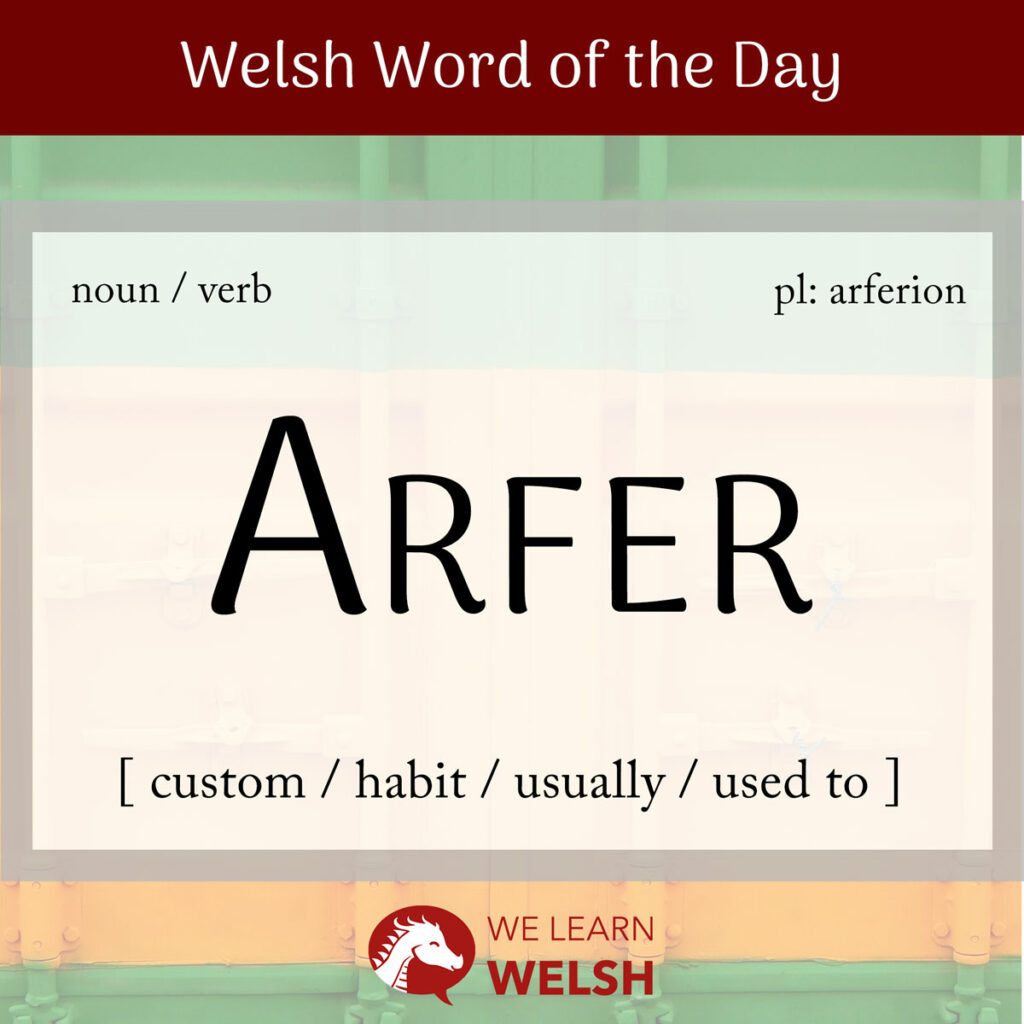Every country has its own unique customs, and Wales is no exception. For instance, it used to be customary to gift a llwy garu (lovespoon) to your beloved as a symbol of affection. In modern Wales, a more common tradition is enjoying a paned (cup) of tea in the afternoon, often accompanied by a slice of bara brith (fruit cake) or a Welsh cake, known as cacen gri in the north and pice ar y maen in the south.
When discussing customs, habits, or traditions in Welsh, there’s one essential word to know: the feminine noun arfer.
arfer
habit / custom
The standard plural form of this noun is arferion but you may also hear the variations arferon, arferau, and arferoedd.
Dw i’n dwlu ar hen arferion Cymru
I really like the old Welsh customs.

In addition to meaning custom or tradition, arfer is also used to form the following two sentence patterns, which you will hear all the time in spoken Welsh.
First of all, arfer can describe an action that you are currently accustomed to doing, or used to habitually do in the past. When this is the meaning, you need to use the following pattern:
the verb “bod” (to be) + yn + arfer + verb
Here are some examples:
- Dw i’n arfer darllen yn y bore. = I usually read in the morning.
- Mae Sarah yn arfer mynd i siopa ddydd Llun. = Sarah usually goes shopping on Mondays.
- Ro’n i’n arfer byw yn Llundain. = I used to live in London.
- Roedd Alan yn arfer chwarae tennis pan oedd yn ifanc. = Alan used to play tennis when he was young.
Roeddwn i’n arfer byw mewn fflat.
I used to live in a flat.
Important: In everyday speech, people generally use the expression fel arfer (usually) in the present tense. So, the previous sentences would become:
Dw i’n darllen yn y bore fel arfer.
Mae Sarah yn mynd i siopa ddydd Llun fel arfer.
If you replace yn with wedi, however, it produces a slightly different meaning. Rather than than meaning “used to do something,” it becomes “used to doing something.”
the verb “bod” (to be) + wedi + arfer + verb
Here is a similar set of examples to those provided above but with wedi instead of yn. Can you see how the meaning has changed ever so slightly?
- Dw i wedi arfer darllen llyfrau anodd yn y Gymraeg. = I am used to reading difficult books in Welsh.
- Mae Sarah wedi arfer siopa ar ei phen ei hun. = Sarah is used to shopping on her own.
- Roeddwn i wedi arfer byw yn Llundain ond dim mwy. = I was used to living in London but not anymore.
- Roedd Alan wedi arfer chwarae tennis bob dydd ond rŵan mae o wedi colli’r arfer. = Alan was used to playing tennis every day but now he’s out of practice.
Dw i wedi arfer gyda siarad Cymraeg.
I am used to speaking Welsh.
You don’t necessarily have to use a verb after wedi arfer – you can also use â / gyda / efo (with) if you are describing a thing or person you are used to, rather than an action. For example:
- Dw i wedi arfer efo fo. = I am used to him.
- Mae’r actor wedi arfer gyda chamerâu yn ei ddilyn e. = The actor is used to cameras following him.
- Maen nhw wedi arfer â gwneud eu harchebu dros y ffôn. = They are used to placing their order over the phone.
Here are a few useful expressions featuring arfer you will hear in everyday Welsh:
- fel arfer = usually, normally
- mewn arfer = in use, in fashion
- allan o arfer = out of use, out of fashion

